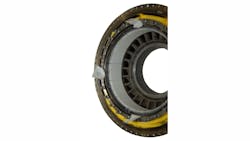EVENDALE, OHIO – November 24, 2014 – GE Aviation and Turbocoating SPA of Parma, Italy, have formed a 50/50 joint venture, called Advanced Ceramic Coatings, to provide thermal barrier coatings for CMCs used in jet engines.
Advanced Ceramic Coatings (ACC) will operate from a dedicated area of Turbocoating’s U.S. operation in Hickory, North Carolina. Advanced Ceramic Coatings will combine Turbocoating’s proprietary coatings technologies and industrial processes with GE Aviation’s coatings processes developed specifically for CMCs to focus on producing advanced coatings applied to GE’s high-temperature CMCs in the post-fabrication phase.
The joint venture expects to deliver its first coated components in late 2015, including CMC shrouds for the best-selling LEAP engine from CFM International, the 50/50 joint company of GE and Snecma (Safran) of France. The LEAP is the first commercial jet engine in the aviation industry to use CMCs in the hot high-pressure turbine section.
The creation of Advanced Ceramic Coatings is one of several recent business initiatives by GE Aviation to create the supply chain required to produce CMCs in large volume. In October of this year, GE Aviation formally opened its new factory for mass producing CMCs in Asheville, NC.
The use of lightweight and heat-resistant CMCs in the hot section of GE jet engines is a significant breakthrough. CMCs are made of silicon carbide ceramic fibers and ceramic matrix, and enhanced with proprietary coatings. With one-third the density of metal alloys, these ultra-lightweight CMCs reduce the overall engine weight.
Equally important, their high-temperature resistance properties greatly enhance engine performance, durability, and fuel economy. CMCs are more heat resistant than metal alloys, allowing the diversion of less cooling air into an engine’s hot section. By using this cooling air instead in the engine flow path, an engine runs more efficiently at higher temperature.
For more than 20 years, scientists at GE’s Global Research Centers and GE’s industrial businesses have worked to develop CMCs for commercial applications.
GE expects the demand for CMCs in its engines to grow tenfold over the next decade. For example, about 7,700 CFM LEAP engines are on order and each engine has 18 CMC turbine shrouds, which are stationary parts in the high-pressure turbine that direct air and ensure turbine blade efficiency. The LEAP engine will enter airline service in 2016. The LEAP engine, now undergoing development testing, will power the new Airbus A320neo, Boeing 737 MAX, and COMAC (China) C919 aircraft.
Later this decade, CMCs will also be incorporated into the combustor and high-pressure turbine section of the new GE9X engine under development by GE to power the Boeing 777X twin-aisle aircraft. More than 600 GE9X engines are already on order today.
About the parent companies:
GE Aviation, headquartered in Evendale, Ohio, is an operating unit of GE and a world-leading provider of jet engines, components and integrated systems for commercial and military aircraft. GE Aviation has a global service network to support these offerings. For more information, visit us at www.geaviation.com
Turbocoating SPA, headquartered in Parma, Italy, has been a leader in surface treatments and manufacturing since 1973 with a core business to develop special processes and manufacture protective coatings for components in industrial gas turbines and jet engines. www.turbocoating.com


